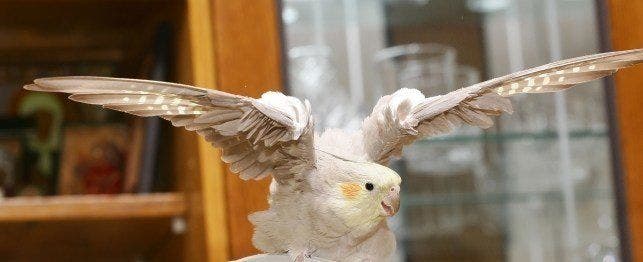
What to Do As Your Bird Learns to Fly
Learning to fly – or fledging – is very important for your bird's developing psyche; for an adult bird, it's great exercise.
When children learn to walk, they develop a much-needed skill while developing confidence. They also make neurological connections that help in other learning processes throughout their lives. For a bird, learning to fly is much the same. Birds allowed to fledge are more confident and more independent. You can help your bird with this process.
- Be aware of height. It's important to create a safe environment for first clumsy flight attempts. Always keep your fledging baby close to the ground. He should only be as high as the couch or coffee table.
- Bird-proof your house. Put away breakables that could be damaged in less-than-perfect landings. Close the drapes and/or the blinds so your bird will be cushioned in case of collision. Make sure doors and windows are closed. Beware of other pets in the house. Even the slightest injury from a cat or dog can mean death within hours for a bird, due to bacterial infection.
- Don't panic. Don't make a big deal out of crash landings. Pick your baby bird up calmly and, while quietly speaking encouraging words, such as, "You're OK. You're such a good bird. It's OK," reassure him that everything's all right.
- Be careful of clipping. If you feel you should trim your baby bird's flight feathers, leave them longer than an adult clip.
Adult Birds in Flight
Try to remember the following when an older bird takes flight:
- Keep a watchful eye. Supervise your bird whenever he's out of his cage. By keeping a close watch on him, you'll prevent many unnecessary accidents.
- Safety first. Make sure that your house is bird-proofed. Ceiling fans must be turned off and windows and doors closed to prevent escape. The kitchen should be off-limits to prevent injury from hot or sharp objects.
- Be aware of height. If you clip the wings of your bird after he has been flighted for a while, make sure your keep him low to the ground until he realizes he can no longer fly.
- Be careful of clipping. If you trim your bird's wings, make sure that only the primary flight feathers and not the secondary glide feathers are clipped.
Outdoor Flight
Some people free-fly their birds outside. This is dangerous because of the devastating consequences one little mistake can cause. No matter how bonded a bird may be to you, you can never predict what may spook him and cause him to fly off. Once your bird gets too far away, he'll get more scared and fly even further. It doesn't take long for your bird to be miles away from home, lost, alone and subject to the dangers of predators and the elements.
Don't Touch Bird Droppings!
If your bird is often out of his cage, his droppings will follow, so beware: Bacteria are found in the feces of most animals – including birds. These bacteria are commonly associated with food poisoning in people.
Good sanitation is the key to prevention. Wash your hands carefully when cleaning up after your bird and dispose of his fecal matter promptly someplace where your family won't come into contact with it.